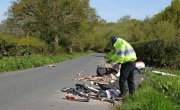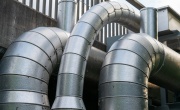LGA calls for landfill tax to be returned to flood-hit communities
Almost 30,000 tonnes of water-damaged household goods collected from areas of the UK affected by the recent floods have been sent to landfill, costing almost £2.25 million in landfill taxes, according to research by the Local Government Association (LGA).
This figure comes from a ‘snapshot analysis’ performed by the LGA, which represents over 370 councils across England in Wales. It focuses on floods caused by Storms Desmond and Frank, which caused devastating damage in areas of Cumbria and Lancashire in December.
Water damaged items can’t be recycled as they are classed as contaminated so flood-affected household goods must be sent to landfill sites, the tax for which is just over £82 per tonne.
The LGA is now calling for the landfill taxes incurred to be returned to the local councils, allowing the money to be invested into the flood-hit areas rather than going to the Treasury.
Communities struggling to recover
The total economic impact of the recent flooding is still being assessed by the affected local authorities, but the LGA estimates that an average of 1.66 tonnes of household goods and freezer waste has been collected from each of 16,500 flooded homes or businesses by council, leading to a large waste disposal bill.
In additional to the additional waste caused by the floods, the LGA estimates that costs for the repair of roads and bridges in the affected areas will run into hundreds of millions of pounds. It expects that local authorities will require more help from the government in the next few months and hopes an application will be submitted to the EU solidarity fund by the government to help communities that are struggling to recover.
Government stance
The Environment Agency has previously said that, contrary to the views held by some, not all flood waste needs to be considered as hazardous and can be recycled in some instances. A spokesperson said: “Household items which need to be removed after flooding can in many cases be treated in the usual way for this type of waste. While items such as carpets and furniture may be damaged or contaminated and unsuitable for reuse, they are unlikely to be classed as hazardous after flooding unless they have come into contact with a significant amount of oil or other hazardous materials.”
The Department for Communities and Local Government has also indicated that the clean-up costs from the flooding can be met from the £51-million ‘Communities and Business Recovery Scheme’, through with local authorities have been provided with £500 for every household affected, although the government’s website indicates this is ‘intended to help with recovery costs, such as temporary accommodation’.
Councils “pulling out all the stops”
Councillor Peter Box, LGA Environment Spokesman, said: “Councils have been pulling out all the stops to help businesses and households that have been ravaged by the floods. This has included taking about 30,000 tonnes of flood-damaged household goods, like furniture and freezer waste, to landfill sites. As these items are ‘contaminated’ with floodwater, councils cannot recycle them and they have to be taken to landfill sites – which is costing millions.
“We are calling on government to allow councils to keep all of this landfill tax. This money could make a major difference in helping councils to continue their sterling work with the massive clear-up and returning households and businesses to normality.
“Councils continue to give their all for flood-hit areas. The sense of community spirit across the country and huge efforts of council staff who have worked long hours and with little rest has been inspirational.
“Even now, council staff are also preparing for the possibility of further severe storms to ensure the safety of residents, homes and businesses, shore up flood defences, and protect road networks and power supplies as much as possible.
“People should keep an eye on council websites and social media feeds for updates on the situation in their local areas.”






